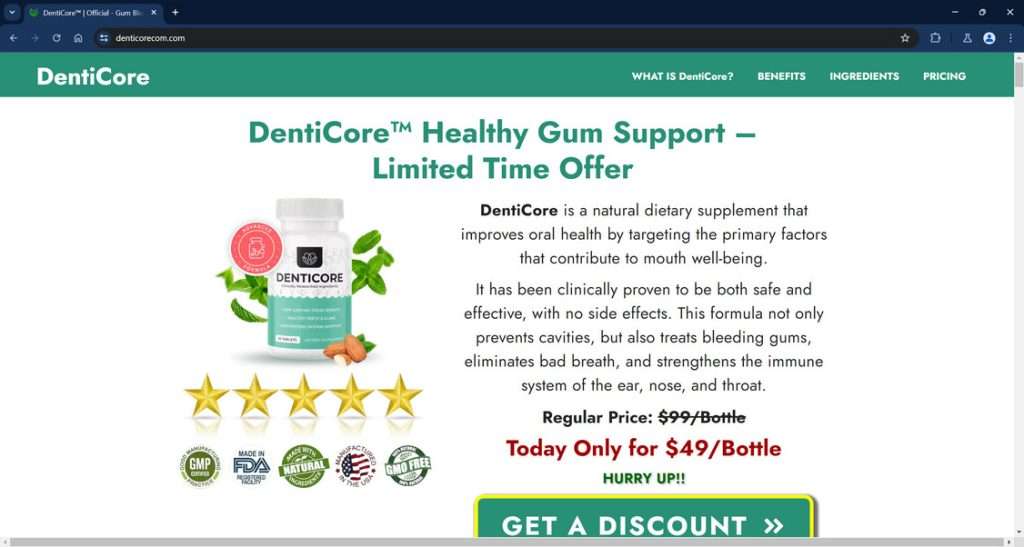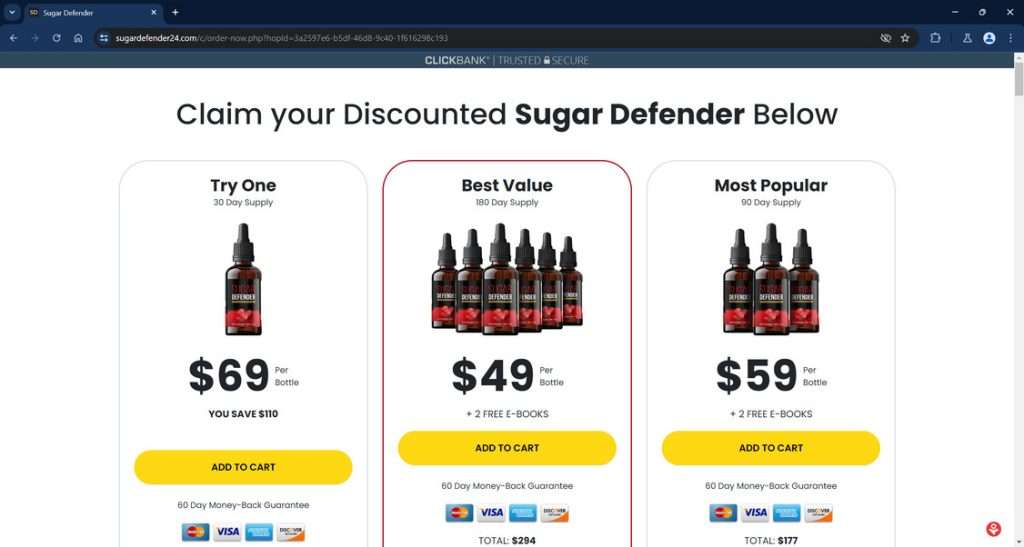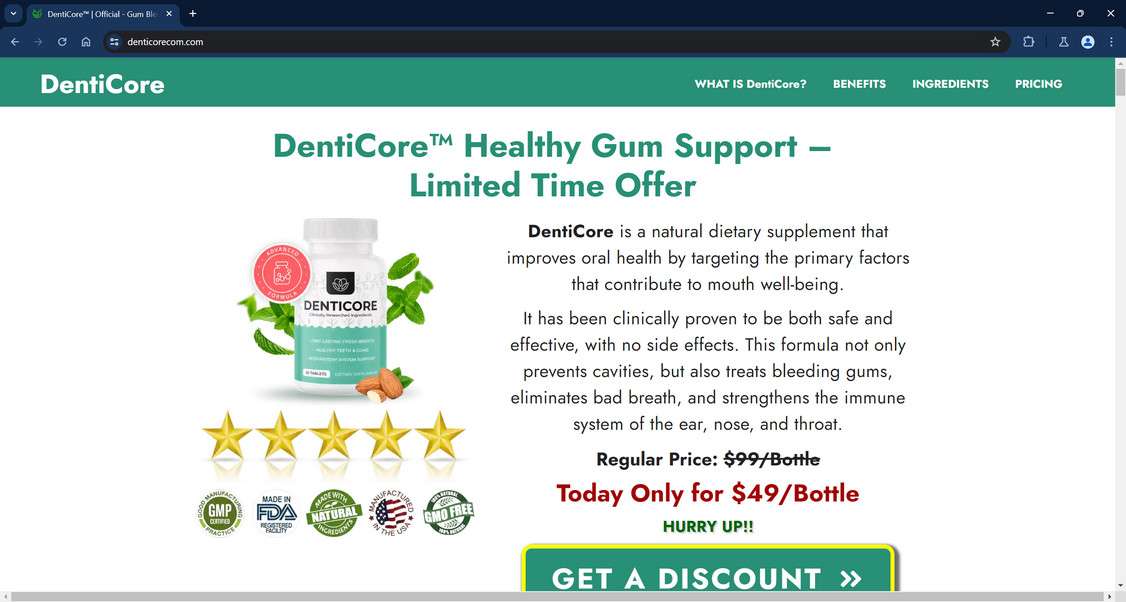A new supplement called DentiCore is being heavily promoted online for natural teeth and gum support, making bold claims it can strengthen teeth, oxygenate gums, remove plaque, and more. However, investigations into DentiCore reveal suspicious marketing tactics and a lack of evidence to support the advertised benefits.

Overview
DentiCore first captured attention through advertisements on social media and Google, featuring convincing before-and-after photos and testimonials from people claiming the supplement gave them healthier teeth and gums almost overnight.
The marketing uses exaggerated language like “dentist’s worst nightmare” and “rotting teeth gone in days.” The ads claim DentiCore “oxygenates gums” to reverse decay, inflammation and other oral health issues.
But looking closer reveals several concerning red flags surrounding DentiCore, including:
- No Named Company/Creator – DentiCore is not sold through any official company website listing its formulators or their credentials. No way to verify who created it.
- No Clinical Trials Cited – No links are provided to any peer-reviewed studies that clinically tested DentiCore’s formula and found proven benefits for gum or tooth health.
- Suspicious Customer Photos – The before and after photos appear doctored and generic rather than real DentiCore users. Some images appear stolen from dental clinic websites.
- Overstated Claims – Statements like “regrowing rotten teeth in days” are simply not scientifically plausible and unsupported by evidence. Major embellishment of potential benefits.
- Auto-Shipment Scams – Many complaints of customers being signed up for monthly DentiCore subscriptions without consent after the initial purchase.
- No Refund Allowed – The website states refunds are offered if customers are unsatisfied, but many report being unable to obtain refunds on unused bottles.
While not definitively a scam, DentiCore exhibits many troubling signs seen with products marketed deceptively online. Let’s scrutinize further whether this supplement offers anything of value for your dental health or is best avoided.
What’s Actually In DentiCore?
The ingredients contained in DentiCore are said to include vitamins, minerals, and herbal extracts like chlorella, chicory root, and celandine. However, without an official ingredients list from the manufacturer, there is no way to confirm the supplement contains what is advertised.
Some of the ingredients like vitamin C, calcium, and magnesium could plausibly offer general health benefits. But there is no evidence they can “remineralize” teeth and regenerate gum tissue as claimed.
No ingredients in DentiCore have clinically verified abilities to regrow rotting or missing teeth, prevent cavities, or achieve other such dental health miracles. Beware of exaggerations.
Website and Company Behind DentiCore Raise Red Flags
There is no official company website for DentiCore with background on the creators, scientific advisors, contact info or company details. The only information comes from affiliate marketing sites like ClickBank designed to promote products.
This lack of transparency about who formulated DentiCore and is profiting from sales is highly concerning. Without an accountable business officially standing behind the supplements, there is ample room for spurious quality, false advertising, and ignoring customer complaints.
Additionally, the marketing sites use nearly identical templates, text and disclaimers as shady supplements like Cortexi and Sugar Defender exposed as scams – likely the same anonymous network of grifters.


These important red flags suggest customers could be putting their health and money at risk buying from such disreputable and undisclosed sources.
Reviews From Real Customers Are Highly Negative
While the DentiCore sales pages boast hundreds of 5-star reviews praising its effects, objective customer ratings on independent sites tell a very different story.
On average, DentiCore earns just 1-2 stars from verified purchasers, with complaints including:
- “No benefits noticed” – No matter how long taken as directed, DentiCore did nothing to improve gum health or dental problems.
- “Can’t get refund” – Unable to obtain promised refunds for unused bottles returned unopened, company refused refund requests.
- “Product never arrived” – Customers paid for DentiCore but never received any product, just endless excuses and billing runarounds when inquiring.
- “Shady auto-billing” – Being enrolled in expensive monthly DentiCore subscriptions without consent after the initial purchase. Difficult to cancel.
Across dozens of comments, real customers consistently report DentiCore had no benefit for their teeth or gums, while posing monetary risks from automatic shipments and refused refunds.
Experts Urge Caution on Dental Health Supplement Claims
Reputable dental organizations like the ADA have strongly cautioned consumers about supplements advertised to cure dental issues like DentiCore. They warn that no pills or liquids have been scientifically proven to rebuild eroded tooth enamel, replace lost teeth, or cure tooth decay and gum disease.
While supplements may support oral health, products promising dental miracles are almost certainly making misleading claims aimed at selling products rather than accurately informing. Patients with concerns about their dental health should stick to proven treatments from qualified dentists.
Frequently Asked Questions about DentiCore
1. What is DentiCore?
DentiCore is a dietary supplement marketed as a “unique dental solution that supports healthy teeth and oxygenates gums”. It comes in the form of chewable tablets that contain a blend of vitamins, minerals, and herbal extracts. The marketing claims DentiCore can strengthen enamel, regenerate gums, reverse cavities, whiten teeth, and more.
2. Who makes DentiCore?
The company behind DentiCore is not disclosed. DentiCore is only available for purchase online, primarily through affiliate marketing websites. There are no references to a parent company, headquarters location, or founder associated with the DentiCore brand.
3. Is DentiCore FDA approved?
DentiCore and its website indicate it is manufactured in an FDA-approved facility. However, the FDA does not “approve” supplements in the same way it does medications. DentiCore has not undergone FDA review or approval for safety, effectiveness, or purity. Its claims remain unverified by regulators.
4. How does DentiCore work?
According to the marketing claims, DentiCore works by providing vitamins and minerals meant to nourish gums and teeth, while the herbal antioxidants are claimed to “cleanse” the respiratory tract to improve oxygenation. However, there is no clinical evidence cited to support these purported mechanisms of action.
5. What benefits does DentiCore claim to provide?
DentiCore claims to strengthen tooth enamel, regenerate receding gums, reverse cavities and tooth decay, whiten teeth, cure bad breath, and even regrow missing teeth. These claims are not backed by any scientific proof.
6. Are the claims scientifically proven?
No, DentiCore’s dramatic claims about being able to regenerate enamel, rebuild cavities, cure advanced gum disease, and regrow missing teeth are not backed by any peer-reviewed clinical studies showing proof. The ingredients may support general oral health but lack evidence for the specific benefits claimed.
7. What do customer reviews say?
While the DentiCore sales page shows almost entirely positive reviews, outside sources show predominantly negative reviews from verified buyers. Many report the product didn’t work and they could not obtain refunds on unused bottles as advertised.
8. Are there side effects or risks?
There are no documented side effects associated with DentiCore. However, the lack of transparency about manufacturing and limited third-party quality testing raises potential safety concerns. As with any supplement, consult your doctor before use if you have medical conditions or take medications.
9. How is DentiCore priced and sold?
DentiCore can only be purchased through the official website, not in stores. A single bottle costs $69, with additional bulk discount pricing. However, many customers report being enrolled in monthly auto-shipments without consent, making the product difficult to cancel. Refunds are also nearly impossible to obtain based on customer complaints.
10. Is DentiCore recommend by dentists?
No, DentiCore is not formally recommended or endorsed by any dental professionals associations or accredited dentists. No dental experts are associated with formulating or verifying the effects of the DentiCore supplement formula.
11. Is DentiCore a scam?
While not definitively provable as an outright scam, DentiCore exhibits multiple red flags like exaggerated claims, fake reviews, lack of transparency, and auto-billing practices that warrant skepticism. There is no reliable clinical proof DentiCore can deliver on its incredible claims of regenerating dental health. Customers are advised to consult real dentists for dental care advice instead of experimental supplements.
The Verdict: Avoid DentiCore and Other Dubious Formulas
In conclusion, DentiCore exhibits multiple warning signs of an ineffective supplement at best, or an outright scam at worst:
- No real company/formulator transparency
- Bold claims lacking scientific evidence
- Fake reviews and doctored before/after photos
- Refusal to issue refunds for unsatisfied customers
- Hidden “autoship” enrollment tactics
While DentiCore is marketed using language that preys on dental health fears, no evidence suggests it can uniquely support oral wellness better than simple brushing, flossing, and real medical treatment if needed. Consumers should steer clear of this formula sold through shady websites, as well as other similar dental health supplements making outlandish benefit claims. Consult real dentists instead for solutions.
This article is for informational purposes only and should not be relied upon for financial or business decisions. We identify potential scams using research, user experiences, and expert analysis. However, all claims should be independently verified. Mistakes may occur, and legitimate products could be flagged. We strive for accuracy but make no warranties regarding the completeness or reliability of the information.
If you are the owner of the website or product in question and wish to offer clarifications regarding your business or website, please reach out to us via our Contact form.



![How to Remove Flowlab.rest Pop-ups [Virus Removal Guide] 10 McAfee scam 4](https://malwaretips.com/blogs/wp-content/uploads/2023/08/McAfee-scam-4-290x290.jpg)